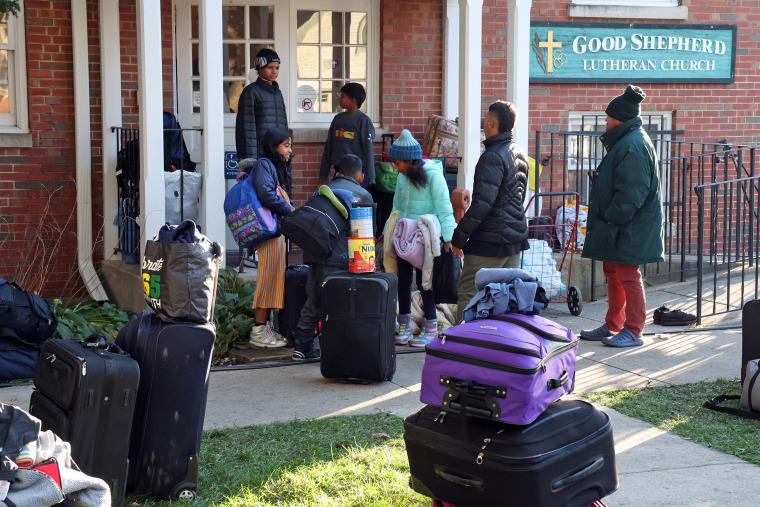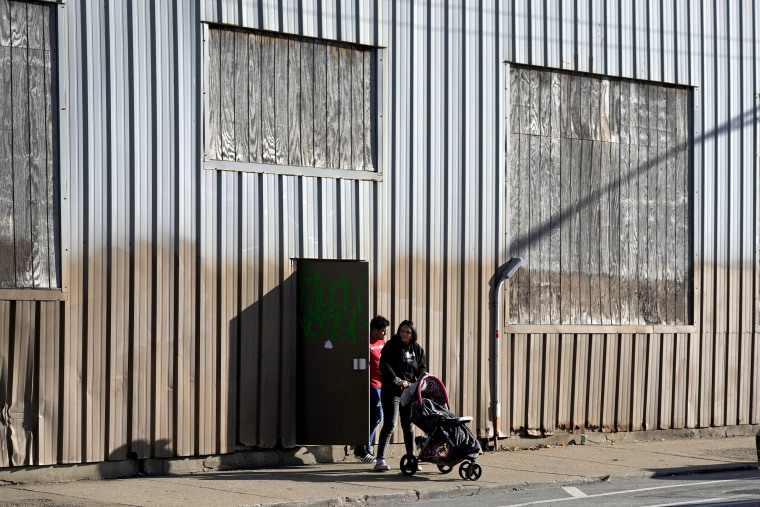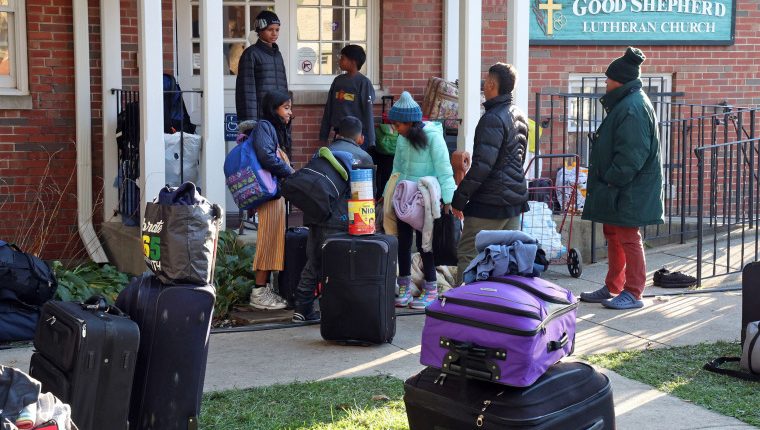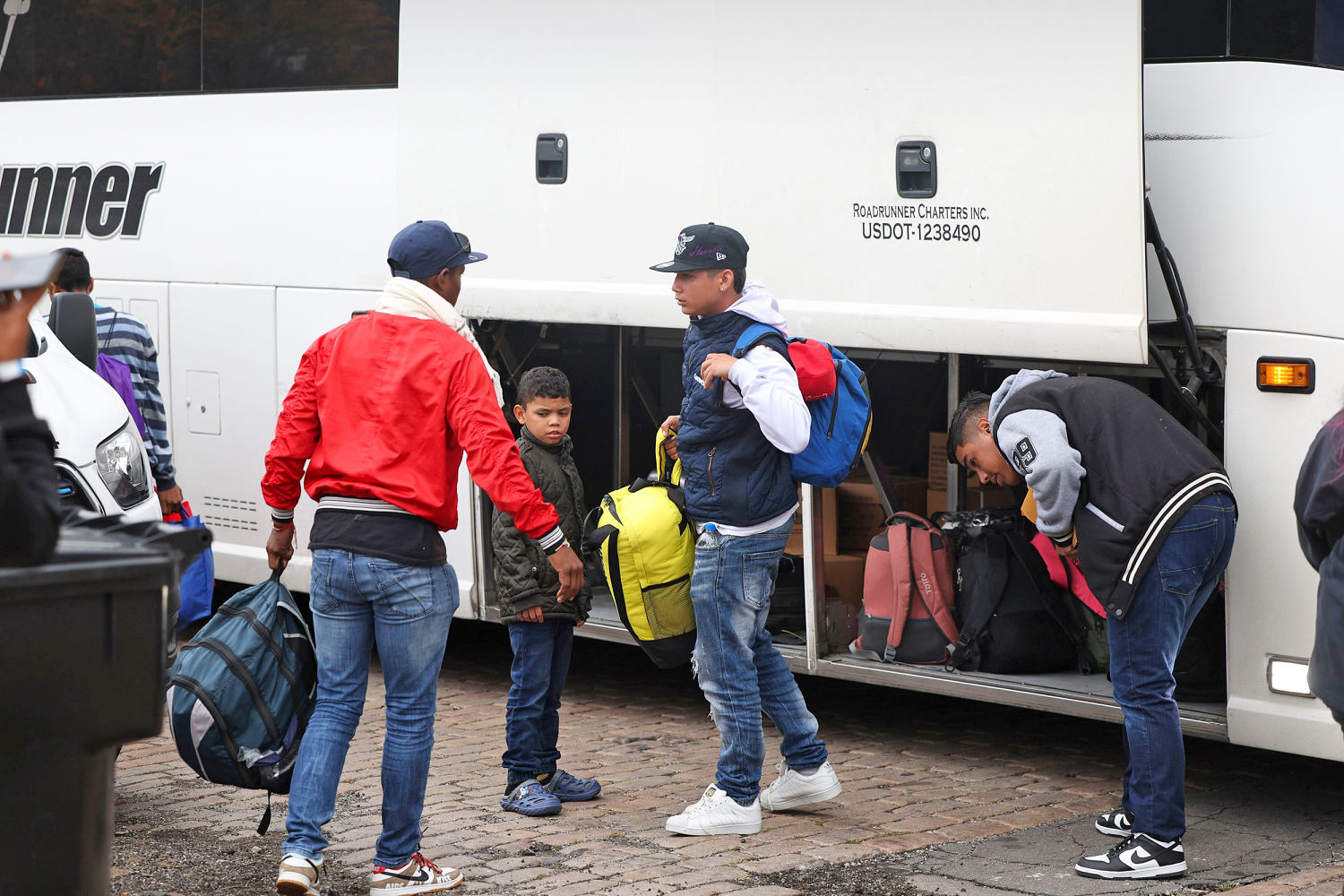Several Chicago suburbs are moving to pass policies that would restrict buses seeking to drop off migrants unannounced in their communities as Texas continues to send thousands of undocumented immigrants to the area.
The proposed policies would require bus operators to seek approval before they unload people. Chicago, which has been struggling to house the busloads of people who have arrived over the last year, had established protocols for drop-offs that resulted in some bus companies’ leaving migrants in suburbs outside the city, instead.
At least four of those communities are taking up the issue at meetings Tuesday evening.
“Mayors are looking at this for the same reason the city of Chicago did, which is that the chaotic nature of having buses just coming in and dropping people off at a train station or some other place within the city is not a good solution,” said Michael Turner, the mayor of Woodstock.
On Saturday, a bus dropped off about 35 migrants headed for Chicago at a train station in Woodstock, a community of about 25,000 that is around 50 miles from Chicago, Turner said.
“Bus companies apparently are looking for other places to drop these people off, and that just adds to the disorganization and the chaos of the situation,” he said. “It’s not something we as a city can manage.”
The Woodstock City Council will vote Tuesday on a proposed ordinance that would prohibit transporting large groups without coordination with the city and an application. As part of the application process, “the applicant must state individuals who will be responsible for the care of the people being dropped off, along with giving the City time to verify an applicant’s ability to care for them,” according to a meeting agenda packet on the city’s website. Violating the ordinance would lead to a $10,000 fine in addition to $750 per passenger.

While the 35 migrants dropped off in Woodstock on Saturday already had train tickets to Chicago and a guide, Turner said that if more buses keep coming, “it has the potential to be difficult to manage.”
As of Tuesday morning, 14,706 residents were in 27 active city-run shelters in Chicago, with 244 more waiting for placement in O’Hare International Airport, 56 at the city’s landing zone and eight at police districts, according to a city census of new arrivals. According to the city, more than 29,000 asylum-seekers and migrants have arrived since August 2022, when Texas Gov. Greg Abbott’s migrant busing program reached Chicago. The city did not immediately respond to a request for comment on nearby municipalities’ taking up their own ordinances about the buses carrying migrants.
According to Chicago, some of the nearby municipalities where companies have tried to drop off passengers are Rosemont, Cicero and Schiller Park, in addition to a flight with more than 350 migrants into Rockford.

Around 1 a.m. Sunday, a private plane with about 355 migrants landed at Chicago-Rockford International Airport, in Rockford, about 70 miles from Chicago, officials in Rockford and Chicago said.
“As many people may know, the City of Chicago recently adopted an ordinance with certain requirements related to the arrival of migrants. As a result, the governor of Texas has redirected buses and planes to other nearby cities,” Rockford Mayor Tom McNamara and officials from Winnebago County said in a statement.
A Chicago spokesperson said in a statement Sunday that Rockford authorities alerted the city about the flight and that upon landing, the migrant passengers boarded eight buses chartered by Abbott. The buses dropped passengers off in various suburbs, where they made their way to the city by train and other means, Chicago said Sunday. The city added that the buses had not dropped off the migrants in Chicago’s official landing zone.
On Tuesday evening, the Joliet City Council will vote on an ordinance that would require operators of unscheduled intercity buses to apply for approval to arrive and drop off passengers at least five days before requested arrival dates, according to an ordinance listed in the meeting agenda. The applications would require proposed passenger lists and background checks on passengers, according to the ordinance.
No more than one application would be approved for a specific date or location, with unscheduled intercity buses permitted to unload passengers from 9 a.m. to 5 p.m. Monday through Friday. Penalties would include impoundment and fines of $750 per passenger, according to the ordinance.
“We’re kind of following the lead of some of the other communities around us that have passed ordinances to try and control the buses when they come up from Texas and other places,” Joliet Mayor Terry D’Arcy said.
D’Arcy said he has been coordinating with Will County and assisting with two recent buses that carried 30 to 40 people each.
“We’ve been pretty successful at moving the buses that have come through and tried to stop at some of the communities to move them up to the landing zone in Chicago where they process the asylum-seekers,” he said.
D’Arcy said that with the ordinance, “we’re trying to be proactive and make sure that everything flows the way it should.”
The villages of Buffalo Grove and Hinsdale will also take up ordinances about regulating unscheduled bus stops Tuesday.
Other communities have already passed similar measures, including the villages of Elburn and Chicago Ridge and recently the cities of Aurora and McHenry.
The McHenry City Council passed an ordinance Friday with a $10,000 penalty for buses dropping off migrants without notice.
And the week before, the Aurora City Council passed an ordinance requiring an approval process, at least five days’ notice, detailed plans of how migrants will be cared for and fines of up to $1,000 per passenger.
Source: | This article originally belongs to Nbcnews.com









